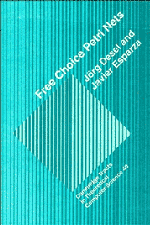Book contents
- Frontmatter
- Contents
- Preface
- 1 Introduction
- 2 Analysis techniques for Petri nets
- 3 S-systems and T-systems
- 4 Liveness in free-choice systems
- 5 The Coverability Theorems
- 6 The Rank Theorem
- 7 Reduction and synthesis
- 8 Home markings
- 9 Reachability and shortest sequences
- 10 Generalizations
- References
- Index
- List of symbols
- List of main results
8 - Home markings
Published online by Cambridge University Press: 21 October 2009
- Frontmatter
- Contents
- Preface
- 1 Introduction
- 2 Analysis techniques for Petri nets
- 3 S-systems and T-systems
- 4 Liveness in free-choice systems
- 5 The Coverability Theorems
- 6 The Rank Theorem
- 7 Reduction and synthesis
- 8 Home markings
- 9 Reachability and shortest sequences
- 10 Generalizations
- References
- Index
- List of symbols
- List of main results
Summary
A home marking of a system is a marking which is reachable from every reachable marking; in other words, a marking to which the system may always return. The identification of home markings is an interesting issue in system analysis. A concurrent interactive system performs some initial behaviour and then settles in its ultimate cyclic (repetitive) mode of operation. A typical example of such a design is an operating system which, at boot time, carries out a set of initializations and then cyclically waits for, and produces, a variety of input/output operations. The states that belong to the ultimate cyclic behavioural component determine the central function of this type of system. The markings modelling such states are the home markings.
In Section 8.1 we show that live and bounded free-choice systems have home markings. In Section 8.2 we prove a stronger result: the home markings are the reachable markings which mark all the proper traps of the net.
Existence of home markings
Definition 8.1Home marking
Let (N, M0) be a system. A marking M of the net N is a, home marking of (N, M0) if it is reachable from every marking of [M0〉.
We say that (N, M0) has a home marking if some reachable marking is a home marking.
Using the results of Chapter 3, we can easily prove the following proposition.
Proposition 8.2Home markings of live S- and T-systems
Every reachable marking of a live S-system or a live T-system is a home marking.
- Type
- Chapter
- Information
- Free Choice Petri Nets , pp. 169 - 184Publisher: Cambridge University PressPrint publication year: 1995



